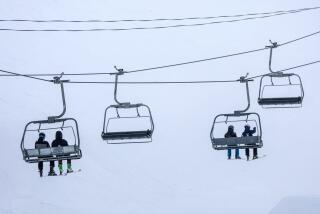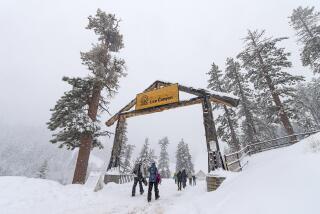Rescue Dogs Train on the Slopes
- Share via
ALTA, Utah — As the helicopter landed, the dogs stared intently at the craft while blinking back snow kicked up by the whirling blades.
The pack, mostly Labrador retrievers and German shepherds, waited with their handlers to hop in for a ride to a staged avalanche. Once there, the dogs began the search for volunteers buried in the snow.
It was the third day of Wasatch Backcountry Rescue’s avalanche rescue dog seminar. More than 20 teams of highly trained dogs and their handlers from throughout the West gathered in Little Cottonwood Canyon for four days of training and mock rescues.
“It’s kind of a boot camp for dogs. They’re out here for four days from 10 a.m. to 4 in the afternoon. They get to do three or four search problems per day,” said Ben Meyerson, a 15-year veteran of Alta Resort’s ski patrol.
Wasatch Backcountry Rescue, founded in 1976, is made up of volunteers from nine Utah resorts and a helicopter skiing company, Wasatch Powderbird Guides. Every two years, the rescue group holds the seminars.
While the handlers from resorts from Nevada to Canada exchanged information, the dogs became acclimated to riding on a snowmobile and jumping into a helicopter while its blades whirl overhead.
Troy Quesnel, from Idaho’s Sun Valley Ski Resort, waited with his 3-year-old Lab, Kintla, for her first helicopter ride.
“It’s extremely helpful to get together will all these other handlers. You learn things you could never get training on with the little groups you have back home,” Quesnel said. “We’re having a good time at camp.”
Avalanche rescue dogs are usually purebreds: Labrador retrievers, German shepherds, border collies and golden retrievers. They have to be smart, athletic and preferably of a medium size, because those are easier to load into a helicopter or onto a snowmobile.
“You can’t have a submissive dog. They have to be a high-energy, high-drive dog,” Meyerson said. “We have guys at Alta that come on as secondary handlers. We give them a trained dog and the dogs are so good, they basically train the handlers.”
Paul Molnar, on Copper Mountain Ski Resort’s ski patrol in Colorado, had his 2-year-old Lab, Tucker, out on the slopes the second day he got him.
“I was skiing around with him. He was in my jacket with his head sticking out,” Molnar said. “He’s a lucky dog, and it’s a great life.”
But it’s serious work. If a slide happens and trapped skiers aren’t using avalanche beacons, a search dog is their only hope, Molnar said.
For the most part, the dogs don’t know that.
“It is just a game to the dogs. You just want to make things really simple,” Meyerson said. “It’s not much different than playing fetch or getting the paper. What you want to do is make the search game their favorite game.”
But when the search ends in tragedy, Meyerson said, the dogs know it.
“Their ears will go down, their tails will go down,” he said.
At some resorts, the dogs are owned and kept by the patrollers as pets. However, it’s more common that the resort owns the dog. If a patroller leaves, he or she leaves the dog at the resort. Such is the case with Meyerson and Bengt, the 4-year-old black Lab he works with.
“She’s lived here her whole life, and she loves her work,” Meyerson said. “I can’t take her from that. Maybe someday she’s going to save somebody’s life.”
More to Read
Sign up for Essential California
The most important California stories and recommendations in your inbox every morning.
You may occasionally receive promotional content from the Los Angeles Times.













